|
Winter is here and in full swing! Thanks to weather changes, nutritional needs change from season to season. In the winter, we are constantly switching from cold outdoor temperatures to dry, heated indoor environments, increasing the risk of infection. One of the best ways to sustain a robust, healthy immune system this winter is by maintaining a balanced diet rich in various nutrients and incorporating daily movement. Sticking to a balanced diet won’t prevent you from getting sick necessarily, but a well-supported immune system can help better protect you. So, the question is, what foods will support our immune system and overall health this winter? Here are a few tips to keep in mind during these colder months of the year! 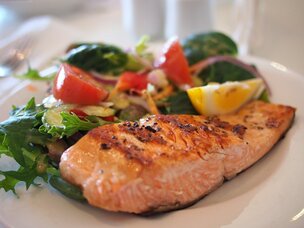
Vitamin D deficiency is quite common and is associated with:
Food Sources of Vitamin D:
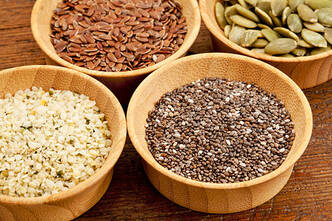
Some examples include:
There are several foods rich in Omega-3 fatty acids like:
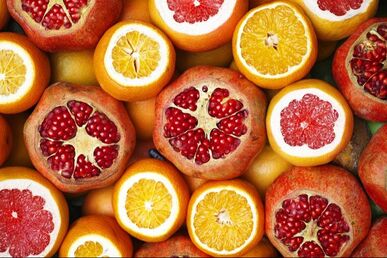
Here are two delicious recipes that are packed with nutrients and perfect for the wintertime ~ 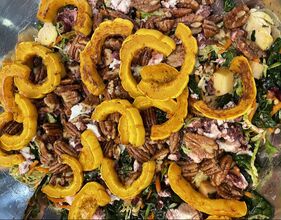 Ultimate Winter Salad Yield: 8 entrée servings or 16 side servings Ingredients: 6 oz. weight shredded kale ½ small lemon, juiced 1 Tbsp. extra virgin olive oil 6 oz. weight shredded vegetables (Brussel sprouts, cabbage, carrots) 2 medium apples, cored & diced 1 ½ cups candied pecans (see note) 4 oz. weight crumbled goat cheese 1 ½ cups roasted delicata squash (see note) ½ cup pomegranate arils For the Dressing: ½ cup red wine vinegar 4 tsp. whole-grain or Dijon mustard 4 tsp. pure maple syrup ¼ tsp. sea salt ¼ tsp. ground black pepper ½ cup extra virgin olive oil Instructions: 1. Put the shredded kale in a large salad bowl. Add lemon juice and extra virgin olive oil. Use your hands to massage the lemon juice and olive oil into the greens - about a minute or so. The kale should wilt slightly and deepen in color. 2. Add the other shredded vegetables/greens, chopped apple & candied pecans to the bowl. 3. Make the dressing by combining all of the dressing ingredients in a lidded glass jar or canning jar. Shake vigorously for 30 seconds. Pour the dressing over the salad & mix well. 4. Add the crumbled goat cheese, delicata squash, and pomegranate arils to the top. Serve & enjoy! Nutrition per serving: 330 calories; 27g Fat; 11g Protein; 17g Carbohydrates, 250mg Sodium, 375mg Potassium 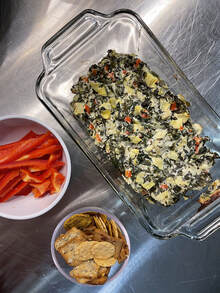 Hot Spinach Dip Yield: 3 cups (24, 2 Tbsp. servings) Ingredients: 1 (10 ounce) package frozen chopped spinach, thawed & drained well ½ cup red bell pepper, diced 2 Tbsp. minced garlic ½ lemon, juiced 1 (6.5 ounce) jar artichoke hearts, drained & mashed ½ cup light cream cheese ¼ cup nonfat Greek yogurt ½ cup grated Parmesan or Mozzarella cheese Ground black pepper, to taste ¼ tsp. crushed red pepper (optional) Instructions: 1. Preheat oven to 350 degrees F (175 degrees C). 2. Mix together spinach, bell pepper, garlic, lemon juice, artichokes, cream cheese, Greek yogurt, and cheese. Season with pepper to taste. Spoon mixture into a 1-quart baking dish. Top with crushed red pepper if desired. 3. Bake for 20 minutes, or until bubbly. Enjoy with whole-grain crackers, tortilla chips, bread, or your favorite vegetables. Nutrition per 2 Tbsp. serving: 37 calories; 2g Fat; 2.7g Protein; 2.3g Carbohydrates, 82mg Sodium, 62mg Potassium Stay healthy & warm this winter!
-Maheen Jamshidpour, Dietetic Intern Resources: https://my.clevelandclinic.org/health/articles/17290-omega-3-fatty-acids https://www.eatright.org/food/vitamins-and-supplements/types-of-vitamins-and-nutrients/how-vitamin-c-supports-a-healthy-immune-system
2 Comments
Companies have mass-marketed mushroom products the past few years, such as powder blends, mushroom complex dietary supplements, and even mushroom lattes. Why this influx of new products? Curious consumers are looking into the wide range of benefits mushrooms provide. Although mushrooms have recently become a trend, fungi themselves have had known benefits for thousands of years, dating back to ancient Egypt, where fungi were believed to provide immortality. Believe it or not, they were not too far off.  Quick Facts: -Like plants and animals, fungi have their own kingdom in the classification of living things; mushrooms are just one type of fungi -There are 14,000 different species of mushrooms -Only 300 species are edible -30 species are domesticated -10 species are commonly grown Let’s discuss some of the benefits of those obtainable and edible. Mushrooms provide a tremendous amount of nutrients, composed of antioxidants, vitamins, and minerals. The composition of nutrients in mushrooms benefits the immune system, cellular system, and vital organs. Immunity Mushrooms are a rich source of beta-glucans, a soluble fiber found in the cell walls of fungi. These beta-glucans are essential in supporting immune health through their involvement in the activation of white blood cells (WBCs). WBCs are involved in fighting off infections and preventing disease. Cellular system Mushrooms have a rich source of dietary antioxidants such as vitamin C, vitamin A, selenium, and beta-carotene, all of which reduce the amount of cellular damage caused by free radicals. The inhibition of free radical damage to our bodies decreases our risk for cancer, heart disease, brain disease, etc. Porcini mushrooms contain an abundance of ergothioneine and glutathione, two of the richest antioxidants responsible for anti-aging properties. Brain health As the name suggests, Lion’s Mane is known for its “hair-like” features and its proposed cognitive benefits in supplement form. As mentioned previously, antioxidants play a huge role in anti-aging properties. A 2017 animal study researching the efficacy of Lion’s Mane on cognitive health found improved memory and neuronal function in healthy mice. Lion’s Mane contains two compounds involved in stimulating brain cells and preventing neuronal damage: hericenones and erinacines. 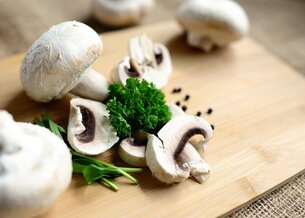 Gut health Mushrooms also contain prebiotics, compounds found in foods that provide nutrition for the probiotics found in our guts. The role of prebiotics is to help promote a healthy microbiome, reducing the potential risk for diseases associated with an imbalance of the gut microbiota. Supplementation Speak to your healthcare provider before taking any mushroom supplement. These could be made from traditional mushrooms used in culinary dishes, certain medicinal mushrooms, or a mixture. Supplements are sometimes in the form of extracts or powders. It is important to research any product thoroughly before taking them as well. -Julie Allocco, Dietetic Intern Resources: Brandalise, Federico et al. “Dietary Supplementation of Hericium erinaceus Increases Mossy Fiber-CA3 Hippocampal Neurotransmission and Recognition Memory in Wild-Type Mice.” Evidence-based complementary and alternative medicine : eCAM vol. 2017 (2017): 3864340. doi:10.1155/2017/3864340 https://foodrevolution.org/blog/mushrooms-nutrition-benefits-risks/ https://foodrevolution.org/blog/medicinal-mushrooms-benefits/ |
SD BlogA place for our consultant Registered Dietitian Nutritionists (RDNs) to share nutrition science, yummy and healthy recipes, tips on seasonal ingredients, and other nutritional musings. Enjoy! Categories
All
Archives
May 2024
|


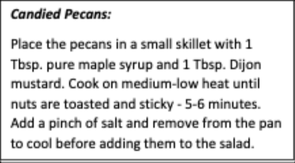
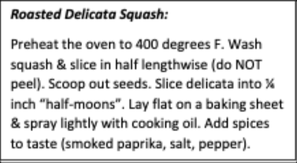

 RSS Feed
RSS Feed